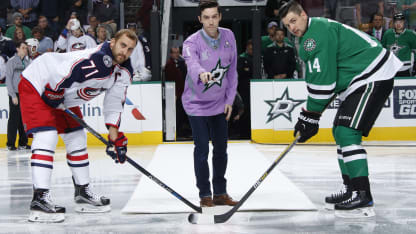Davidge was diagnosed in July 2014 with multiple myeloma, a cancer formed by malignant plasma cells that affects bone marrow. The American Cancer Society estimates there will be more than 30,000 cases diagnosed in 2016, with about 12,000 deaths expected.
Working through chemotherapy and a bone marrow transplant in 2015, Davidge announced on July 25, 2016 he was cancer free and the multiple myeloma was in remission.
"My first test said I had no monoclonal protein in my blood, which basically is a cancer you can't cure but that it was gone. That was a good sign, a real good sign," he told
NHL.com
on Nov. 4. "Then, when I repeated the test last month with the same result, that was another good sign. Now I go in next week and talk to the oncologist to see if they'll cut my chemo in half. I go 14 days on, 14 days off.
"When you're on it, it ravages you. When you're off it, you almost feel human again. … I look for those 14 days of humanness."
His Fox Sports Ohio studio partner, Brian Giesenschlag, has seen Davidge suffer, yet not let it impact his work.
"He had some bad days for sure, but never missed being here and never wasn't the same positive, upbeat guy whether it was pertaining to himself or the team," Giesenschlag said. "I could tell when he was fighting it. I could tell he wasn't feeling good. I really respected that fact he's always an other-people-first kind of guy. It was never about him. It was never about his struggle with cancer unless it was to help somebody else."
Davidge learned he had cancer after a routine blood test administered by the Blue Jackets medical staff.
"I was stunned," he said. "Right away I said, 'Hey, another hurdle in life.' "
It was that positive outlook that helped him through other dark times. He played hockey for Ohio State from 1973-77, getting 101 points (45 goals, 56 assists) in 114 games, and it was on the Columbus campus that he met his future wife, standout OSU tennis player Leann Grimes.
After they each graduated, she became the women's tennis coach at Miami University in Oxford, Ohio, where Davidge was working on his master's degree. He eventually became an assistant for the hockey program, but his life was shattered on Jan. 27, 1985, when Leann was killed in a car accident, shortly after the birth of their son, Rob.
Davidge carried on as best he could and was coach of the Miami hockey program from 1985-89 and later was a part-time scout for the Detroit Red Wings and Florida Panthers.




















